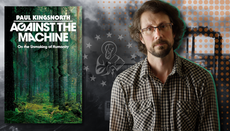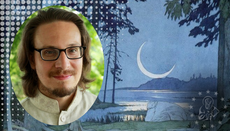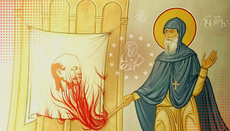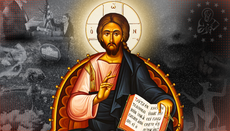Patriarch Tikhon: Angel of the Russian Orthodox Church
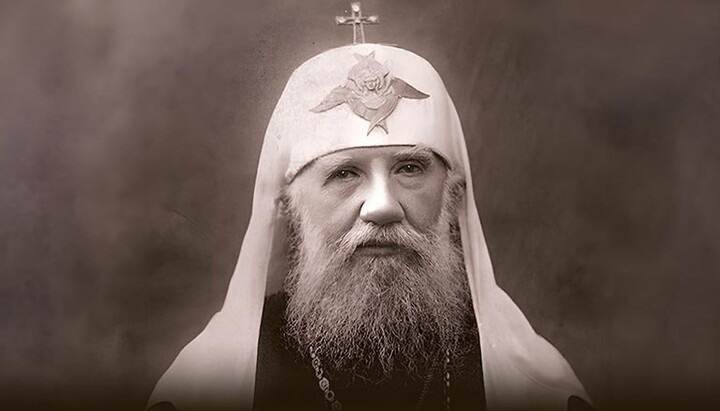
After becoming the Angel of the Church of All Russia and taking up the throne, which had been orphaned for 200 years, Patriarch Tikhon saw before him a Russia which, for her sins, had lost her Tsar. He alone embodied her great and holy past.
Republished with the gracious permission of ROCOR Studies.
What does a man harbor within himself? A name is called: it may strike one’s heart, and a spark ignites. The person hastens to meet the call concealed in this name.
Where does this call lead? Our heart has many strings, and the tones of their resonance are multiplied as a man is enriched by culture. There are hosts of names capable of drawing out a sympathetic response from the depths of our consciousness, and sometimes subjugating us to a particular leading light of our age.
Yet who is behind the leading lights of this world, if not the Prince of this world?
Fortunately for man, there are hosts of names that summon him to something else: the names of those who were able to put to nought all the temptations of this age and be entirely lightened by the light of Christ.
Man is rent in twain! For some of us, we find that there is no more attractive force in the names of those great and glorious people who, perhaps, have been themselves saved as from fire by making their way to God, yet whose works, while at times carrying a reflection of heaven, are earth all the same and can only boast an earthly immortality! If only the names of those beatified as earthly angels by the church had not become quite foreign to us! Terrible is the lot of a man in the void of whose soil the sound of a holy name dies out; for such a sound that has come up inadvertently—as it were, inadvertently!—can perform a miracle by instantaneously shifting the arrangement of his soul from darkness to light. Blessed is he who customarily keeps such names in his conscience: like wings, they will carry him through the squares of this world to the Unwaning Light…
To their number is appended, in our eyes, in the process of our own spiritual growth, that name which is celebrated radiantly this year: that of Patriarch Tikhon.
Quietude and light rest on this Chosen Man of God. Strange to the world, he is close to God and men: it is as such that we see him in his family, at school, in the field of ministry, from his first steps until the end.
The living antiquity of the backwaters of Toropets lent him his first life impressions. The spiritually fragrant age-old Orthodox way of life nourished his soul. Hence its strength, which enabled the boy and youth Vasilii Belavin, while passing through the cycle of theological education, to take all of the good things that it gave him, while passing by all of the dark things that were nesting under its roof and made some more sensitive natures vulnerable to the wiles of this world. Hence, we must think, came that which doubtless would be the firm legacy of the future holy hierarch of this age: living knowledge of the Word of God.
One may know much about it, but only a living knowledge of the Word of God can become a source of grace. It is precisely such knowledge that was inherent to Patriarch Tikhon. He thought and sensed things in terms of the models of the Word of God: it burned and was bright within him. What a great strength this is, which not only has an outward effect but also grants inward power! This is the key to Patriarch Tikhon’s invincibility, devoid as it is of any kind of “heroism”, farfetchedness, grandiloquence. For what does it mean to receive the Word of God in oneself? It means to have a Faith so melded with one’s nature that one’s every move is an action of Faith, and that not in the process of deliberation and extrapolation of a particular case to a general rule, but by the immediate command of one’s heart. This is what it is to be a Christian.
This is how the future Angel of our Church was from his youth. This is how he remained at school. After from the Theological Academy and becoming a seminary teacher in his native Pskov, he became a monk. This was not a turn of fortune, but a joyful discovery of his life vocation, while his closeness to the people made this inner feast a festival for all people, which exactly sixty years ago brought together all of Pskov.
We do not see Hieromonk Tikhon here for long: there was work waiting for him, by then an archimandrite, at Chełm Seminary. His modest, ardent, fruitful engagement was recognized. Archbishop Flavian (the future Archbishop of Kiev) was expecting him as an assistant. The Synod has a hard time infringing on the customary age for those admitted to the episcopate. At last, the 33 years required by the law elapsed – and the future Patriarch Tikhon was appointed bishop to provide pastoral care for the difficult Chełm Region, with its ineluctable historical confessional wounds.
One need not expend words on Bishop Tikhon’s success here. It may suffice to imagine the spirits in the area when he was shortly thereafter transferred to America. The heterodox and those of other faiths regretted his departure, while the Orthodox experienced this as a great sorrow. The popular lament resounded everywhere in churches and at farewell services, while his send-off at the station was a barely imaginable display. People were prepared to lie down on the tracks in order to prevent the train from moving ahead: it took measures of admonition to confine within reasonable bounds the uncontrolled sentiment of the flock’s love for its departing pastor…
And so we see Bishop Tikhon as head of the Orthodox Church in America. His homilies and statements delivered on various occasions are a monument to his sojourn there. They give us a lot in the way of understanding his nature. Not because we are able to make out in them any typical features of Patriarch Tikhon: this is a task that would remain fruitless! What is indicative is that there is nothing “of him” in these statements. “Personal” things may sometimes be brought in, giving his words a shade of touching credulity, for example, his mention in his very first sermon about his old mother he had left behind in Russia… The contents of his sermons are exhausted by their subject. As a preacher, he did not see himself. He saw what he was speaking about, and those to whom he was speaking. All of the strength of his spirit was directed towards finding out the Truth that was the subject of the sermon and making it the common property of all those to whom the sermon was addressed. For example, a sermon delivered to a certain couple who were getting married: unexpectedly, from the lips of this strict monk, the head of a local church, there resounds a laudatory interpretation of the exalted spiritual beauty of marriage, perfused with such warmth that it could not but leave a mark on the hearts of the happy couple as a parting fatherly piece of practical life advice. In order to be able to speak like that, one must be perfused with the Christian self-renunciation that the Apostle Paul expressed in his statement: “he has become all things to all people”!
Wherever it is only a matter of oneself, one must see only oneself: “Be content with your own sins!” —one great Abba taught. Where it is a matter of someone else, one must, on the contrary, have the ability not to see oneself at all! You can thus see a person in Christ, and say and do whatever is necessary for him in Christ. For it is this that is the gift of Christ’s love. The future Patriarch possessed it. To meet everyone where he was, to embrace him in Christ, to immerse himself wholeheartedly in whatever the meaning of this meeting was and to express it, while being, so to speak, the living word of the Church—this is how the Angel of the American Church regards us from the pages of the small booklets reproducing his words from this era.
The Angel of the Church! This designation may relate to each bishop, but it is rare for it to be exhaustive of a person as we see in the image of the future Patriarch. He did not bring any excess of passion into what he did. Solid sedateness, such as was innate in him from his young years – and which in his time at the Academy led his companions to call him the “Patriarch” in jest and cense him upon meeting him – was not a feature of his outward image, but a natural expression of his inner man. He lived in the world but was not a denizen of it. He was a stranger. Patriarch Tikhon’s inner world will be most comprehensible to someone who has grasped the essence of the life philosophy expressed by King David in Psalm 118. We all know the first words of it: “Blessed are the undefiled in the way…” They are associated with the service for the departed. But not all of us know that this Psalm is read at every Nocturns service! This may give an impression of tautology for a person of this world, but it provides inexhaustible material for contemplation for a soul departing this world, and all the more so for one that already has departed it. Its sole theme is the delicate balance that must be unremittingly preserved inside of a person who carries earthly flesh but whose eyes are turned toward God, and who is ready to depart to Him. This psalm, as one for the departed, therewithal expresses how a monk ought to think and what he ought to feel.
Patriarch Tikhon’s attitude to people and things fits fully within this psalm! He sympathizes with all that is good and turns away from all that is not. But where is his place on the map of ideological and societal interrelations? Quite exacting it would be to find it! He is willing to be with everybody, but he is also able to be against anybody. “I am a companion of all them that fear Thee, and of them that keep Thy precepts.” (Ps. 118:63). This verse could be an epigraph for his life’s work. He is not tied tightly or firmly to anything that could put a particular mark on him. This lends a certain lack of color to his figure, condemning it to obscurity. But it does not diminish its moral weight, for this “unmodernness” is underpinned not by passivity or evasiveness, but by an unworldiness incubated by the gift of living love innate in him.
There is a shift in the outward circumstances in which the young bishop Tikhon is acting—he remains one and the same. He has no far-reaching plans, no grandiose aims, no overly tight and constricting ties to the past, no deliberate presumptions with respect to the future. He is an Angel of the Church who restricts his field of vision to fulfilling that to which he is called at a given moment by his position as the Angel of the Church. Thus it was in America. Thus it was in Rostov, where he was transferred already as an archbishop and where he earned universal love and respect. Thus it was in Vilnius, where he met the start of the war. Thus it was confirmed in Moscow, where he was evacuated along with his diocese, carrying with him the relics of the Lithuanian martyrs.
It is difficult to speak of his having a “career”. He was never especially prominent, in the front row, or on everybody’s lips. But for those who were his own, he was always there and theirs. He did not think about anything beyond this, and nobody who was with him desired anything better. He himself thought least of all about his “career”. In this, we see his “Russianness” revealed with particular force. For Russia never sought or pursued a career, either. She grew in a process evocative of the growth of a plant, without willing it directly, involuntarily. One might even say: against her will! She modestly solved the problems at hand, without thinking about expansion or any plans of conquest, while accepting her marvellous growth as a destiny appointed by God, as a difficult obedience and responsibility. Such too was Patriarch Tikhon! We do not see any personal will of his, any determination, ambition, nor haste, nor an adherence to a particular program. Everything flows naturally, while the future Patriarch Tikhon’s task is to fulfill whatever came up by virtue of his office, in accordance with his archpastoral conscience.
Thus his life “flowed by” up to the moment when he, unexpectedly for both himself and others (nobody had even thought of his candidacy!), he ended up as Metropolitan of Moscow: the first to be elected after the Revolution! This is how he came to be, ex officio, the first person of the Moscow Council. This is how, again unexpectedly for both himself and others (for here, too, nobody had thought of his candidacy in advance!), he came to be the first Patriarch of Moscow and All Rus after the restoration of the Patriarchate – and God willed him to be the last, as well [as of the time of writing –trans.]…
And so the sedate, modest Vasia [short for Vasilii, the Patriarch’s baptismal name –trans.] Belavin, who was greeted with incense by his fellow academy students, was Patriarch! He sedately and modestly accepted his new lofty title, too. What it would bring him, what it would demand of him, where it would lead him—God did not hide this from him. His countenance was suddenly imprinted with old age, his brow furrowed with worry lines, the tenderness of his deep-set eyes went away somewhere, the customarily friendly half-smile of his mouth vanished, only to return later and again soften his face, which was illuminated by a new light. He submissively accepted his fate. But with what words did he meet the news of his election? He called it the “roll of a book on which was written: lamentations, and mourning, and woe” (cf. Ezek. 2:9–10)—that scroll which the prophet Joel [sic!] was made to eat of old. He called to mind Moses and how he said to God: “Wherefore hast thou afflicted thy servant […] I am not able to bear all this people alone, because it is too heavy for me” (Num. 11:11–14), which was similar to the care for all of the Churches of Russia that lay ahead of him: to “die daily” (I Cor. 15:31) for them!
And when, in the Holy Dormition cathedral surrounded by processions from all the churches of Moscow, he, already elevated to the Patriarchal Throne and robed in the patriarchal vestments, was handed the Scepter of St. Peter, while glorifying God for his marvelous elevation had arranged been arranged by Him, he juxtaposed it humbly with his own infirmity: “From this realization, my soul is now wrapped in sacred trepidation. Who am I, Lord, O Lord, that Thou hast thus exalted and distinguished me?” He asked God to give him a rational heart, to warm it with love, and finished his sermon with the command of God such as he had perceived it.
“It is as if the Lord is saying to me: Go and seek out those for whose sake the Russian land is still standing and holding fast! But do not abandon the lost sheep, either, who are condemned to perdition, to the slaughter, those truly piteous sheep. Tend them, and for this take up this scepter, the scepter of goodwill. Seek and find any that have been lost with them, bring back those driven away, mend the wounded, heal the sick, and extirpate any that have grown fattened and rambunctious. Tend them with righteousness!”
After becoming the Angel of the Church of All Russia and taking up the throne, which had been orphaned for 200 years, Patriarch Tikhon saw before him a Russia which, for her sins, had lost her Tsar. He alone embodied her great and holy past. The state was no longer a help for him, in the person of an Orthodox Tsar and custodian of the Church—but rather was against him, in the person of the impious enemies of God who had taken over Russia…
Read the whole article at www.rocorstudies.org.
